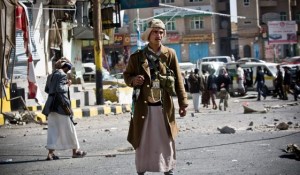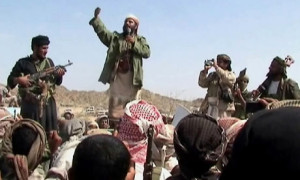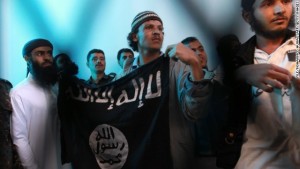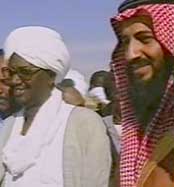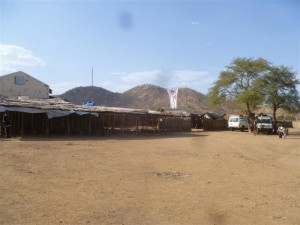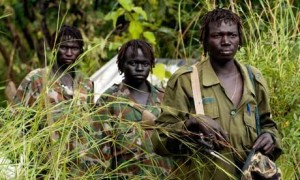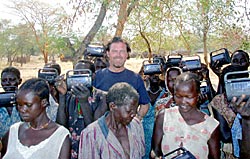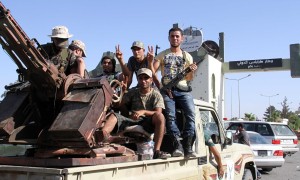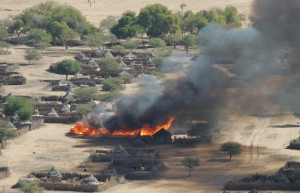Yemen, Khartoum, and Obama Administration Priorities in the “War on Terrorism”
Eric Reeves | January 27, 2015 | https://wp.me/p45rOG-1zB
Recent events in Yemen bring into sharp focus some of the more dismaying features of the Obama administration’s conduct of the “war on terror” in the Arabian Peninsula and beyond. Yemen, the poorest of Arab countries, has long been a breeding ground for the most robust al-Qaeda franchise, and the one responsible for the attack on Charlie Hebdo in Paris. As a consequence, the U.S. has been unrelenting in its use of drones in the country, attacks made possible because they were approved by former President Abed Rabbo Hadi. Still, al-Qaeda has thrived and seems likely to continue to do so for a number of reasons, including Khartoum’s support for the Houthi rebels who forced the resignation of President Hadi.
Houthi forces in Sana’a
Yemen is politically more complex than had been generally recognized before the Houthi rebel group swept into Sana’a, the country’s capital, last September (they began their rebellion over a decade ago and take their name from Hussein Badreddin al-Houthi, a leader killed in 2004). When President Hadi resigned on January 22, the consequences of that “resignation” were not clear and many have yet to unfold. But one thing is clear: he will not exercise nearly as much power as previously. The Houthis are demanding a much greater representation in what passes for government in Yemen. The overall effects of this power struggle are difficult to predict, but it will almost certainly create more operating space for (Sunni) al-Qaeda in the Arabian Peninsula (AQAP) and a likely end to American drone strikes and surveillance. In fact, Associated Press reports (24 January 2015) that “U.S. officials say the unrest already is undermining military and intelligence operations against AQAP.”
Elements of al-Qaeda in Yemen
The Houthis are far from universally supported by the people of Yemen, despite a widely shared religion and a number of the same grievances as other Yemenis. In Sana’a many citizens have made clear their opposition to Houthi claims to power. Associated Press reports from Sana’a (24 January 2015) that “tens of thousands of Yemenis marched in protest on Saturday against Shiite rebels who hold the capital, amid a power vacuum….” Beyond this, there has in the past been serious fighting between the Houthis and Saudi Arabia. In the wake of recent changes within the Kingdom following the death of King Abdullah, the Saudis are likely to be especially vigilant. Fighting by the Houthis only diminishes the chances for anything like a stable government to emerge in Yemen, as the New York Times suggests in a recent analysis:
After Houthi fighters seized control of Sana last year, they were met with almost daily retaliatory attacks from Al Qaeda, including a bombing of a Houthi rally that killed more than 40 people in October. Yemeni officials and diplomats say the Houthis, now led by Abdul-Malik al-Houthi, 33, are backed by Iran. The Houthis deny that link, but the Yemeni authorities have seized ships carrying Iranian weapons that they say were being sent to the Houthis. The government grew weaker in recent months as the Houthis claimed greater control in several ministries. Many observers fear intervention by regional rivals like Saudi Arabia and Iran could cause further unrest. Al Qaeda has used searing anti-Shiite rhetoric to describe the Houthis, leading to additional fears of sectarian bloodletting.
Such bloodletting and chaos are the great allies of AQAP.
That the Houthis are themselves deadly enemies of al-Qaeda in Yemen might seem to be good news. But the increasingly prominent Houthi slogans should give pause: one representative sign at a recent rally in Sana’a read “God is great, death to America, death to Israel, damnation to the Jews, victory to Islam.” The Houthis follow Zaydism, an offshoot of Shiite Islam, which puts them at odds with Sunni countries in the region and explains why their primary regional ally is Iran, which has been responsible for shipping large quantities of weapons to the Houthis—and in this Tehran has not been alone.
In leaked minutes from an extraordinary August 31, 2014 meeting [ http://wp.me/p45rOG-1tC ] of the most senior military and security officials of the National Islamic Front/National Congress Party regime in Khartoum, we learn among other things that Major General Hashim Abdalla Mohammed, Chief of the Joint General Staff, reported on an unexpected difficulty created by Sudan’s own support for the Houthis, referring specifically to the leader of the group:
“We have a problem with Saudi Arabia because they found out about the weapons we sent by way of the Red Sea to Abd al-Malik al-Houthi’s Shiia group in Yemen.”
(The minutes of the August 31 meeting have been extensively vetted and consistently found to be authentic.)
Since these minutes also make clear the unanimous commitment of these powerful men to a “strategic relationship” with Iran, some of the political pieces in Yemen begin to fall into place. For Khartoum is doing what it can surreptitiously to support radical Islam in the region and to thwart U.S. terrorism efforts, such as drone strikes in Yemen. Khartoum has also served as a conduit for weapons shipped from Iran to Hamas in Gaza, and remains on the U.S. list of state sponsors of terrorism because of its open support Hamas, considered a terrorist organization by a wide range of countries. A dispatch from The Guardian (UK), citing a “wikikleaked” U.S. State Department cable, is revealing:
State department cables released by WikiLeaks show that Sudan was warned by the U.S. in January 2009 not to allow the delivery of unspecified Iranian arms that were expected to be passed to Hamas in the Gaza Strip around the time of Israel’s Cast Lead offensive, in which 1,400 Palestinians were killed.” (December 6, 2010 | http://www.guardian.co.uk/world/2010/dec/06/wikileaks-sudan-iranian-arms-gaza )
A range of other reports, including additional “wikileaked” documents, confirm Khartoum’s role in arming Hamas. This has prompted Israel to strike at arms shipments in Sudan bound for Gaza, and even a weapons factory near Khartoum evidently dedicated to weapons of Iranian manufacturing design, with Hamas again the destination.
The Obama administration’s “arrangement” with Khartoum’s génocidaires
It has become increasingly clear over the past six years that the Obama administration’s Sudan policy has as its priority maintaining a counter-terrorism intelligence relationship with the Khartoum regime. The thinking is both practical and expedient. Geographically, Sudan is ideally situated: Yemen (just across the Red Sea from Port Sudan), North Africa, and East Africa are all on Sudan’s immediate periphery (see map of region). Moreover, Osama bin Laden resided in Khartoum from 1992 – 1996, the years in which al-Qaeda came to fruition; and bin Laden maintained many close ties, particularly financial ties, with the regime long after he decamped for Afghanistan. The U.S. knows that there is a great deal that Khartoum might provide in the way of counter-terrorism intelligence.
Osama bin Laden in Sudan with radical Islamic ideologue Hassan al-Turabi (1990s)
The “arrangement” with Khartoum goes back to the previous administration of George W. Bush, entails an almost total indifference to the terrible human realities in Sudan that is required to make this ghastly quid pro quo work. The U.S. agrees not to get serious about Darfur, Abyei, the humanitarian embargo in South Kordofan and Blue Nile, egregious human rights abuses and political repression throughout Sudan—and holds out the promise of removing Khartoum from the U.S. Department of State list of state sponsors of terrorism; Khartoum, in turn, supposedly provides “critical” counter-terrorism intelligence.
[ Previous, more detailed discussions of the ways in which this perverse lust for counter-terrorism intelligence dominates Obama administration Sudan policy may be found at:
- “Sudan embraces genocide, terrorism — and Iran,” The Washington Post, 30 November 2014 | http://www.washingtonpost.com/opinions/sudan-embraces-genocide-terrorism–iran/2014/11/30/2ed603ae-75bb-11e4-a755-e32227229e7b_story.html
- “The Obama Administration, Terrorism, and Hypocrisy,” Sudan Tribune, 6 May 2014 | http://www.sudantribune.com/spip.php?article50897 (Appendices at | http://wp.me/p45rOG-1i6 )
- “What Really Animates the Obama Administration’s Sudan Policy?” 10 October 2011 | http://wp.me/p45rOG-GT
- “Sudan, Terrorism, and the Obama Administration,” February 9, 2011 | http://wp.me/p45rOG-B9 ]
Such a cynical policy consigns many—especially children, the elderly, and the infirm—to face starvation and live with virtually no primary medical care and often without clean water. In the Nuba Mountains of South Kordofan and in Blue Nile, confident that the Obama administration will not do more than bluster about wide-ranging atrocity crimes and genocidal destruction, Khartoum acts with a sense of total impunity. Relief organizations attempting to provide humanitarian aid risk attack: this past week the Doctors Without Borders/ Médecins Sans Frontières hospital in Frandala, South Kordofan was deliberately bombed by a military jet aircraft in South Kordofan—for the second time. There has been no U.S. response of consequence.
MSF hospital in Frandala, South Kordofan
In fact, the Obama administration is so prepared to preserve the relationship with Khartoum around counter-terrorism that it is willing to lie before Congress and turn a blind eye in the process to what Senator, candidate, and President Obama has explicitly called “genocide” in Darfur. Former Obama administration special Envoy Scott Gration testified before the Senate Foreign Relations Committee in July 2009:
“‘There’s no evidence in our intelligence community that supports [Sudan] being on the state sponsors of terrorism. It’s a political decision,’ Gration said.” ( http://www.npr.org/templates/story/story.php?storyId=111422940 )
Major General Scott Gration (Air Force, retired), President Obama’s first special envoy for Sudan (2009). Gration was selected for political reasons; he had no diplomatic experience, no knowledge of Arabic, and nothing but a thumbnail sketch of Sudan’s history to guide him in one of the most daunting of diplomatic tasks facing the new administration. He was, by all accounts, a deeply destructive failure in his crucial undertaking.
This was an extraordinary claim in light of what the Obama administration knew about Khartoum’s assistance to Hamas—including weapons shipments to Gaza—its relationship with Iran, and the U.S. State Department findings in its annual listing of state sponsors of terrorism (April 2009):
Al-Qa’ida-inspired terrorist elements, and elements of both Palestine Islamic Jihad (PIJ), and HAMAS remained in Sudan. In light of the continuing hybrid UN-AU deployment to Darfur, various terrorist threats against this mission have emerged, and AQ leadership has called for “jihad” against UN forces in Darfur. In the early hours of January 1, 2008, attackers in Khartoum sympathetic to AQ shot and fatally wounded two U.S. Embassy staff members – an American and a Sudanese employee – both of whom worked for the U.S. Agency for International Development. [Khartoum’s security forces were later complicit in organizing the escape of several of these men; one of the non-security personnel involved in the 2010 escape was pardoned by President al-Bashir in 2013—ER]
Elements of designated terrorist groups remained in Sudan. With the exception of Hamas, whose members the Sudanese government consider to be “freedom fighters” rather than terrorists, the government does not appear to openly support the presence of extremist elements. We note, however, that there have been open source reports that arms were purchased in Sudan’s black market and allegedly smuggled northward to Hamas.
Things were largely unchanged in the State Department’s 2014 report (the most recent) on state sponsors of terror (Sudan is one of only four such states, among them Cuba—a conspicuously political decision):
[Terrorist] groups continued to operate in Sudan in 2013 and there continued to be reports of Sudanese nationals participating in terrorist organizations. For example, regional media outlets alleged one Sudanese national was part of an al-Shabaab terrorist cell that attacked the Westgate Mall in Nairobi in September. There was also evidence that Sudanese violent extremists participated in terrorist activities in Somalia and Mali. [It is extremely unlikely that Khartoum’s ruthlessly efficient security agencies were unaware of the movements of these men—ER]
In 2013, Sudan continued to allow members of Hamas to travel, fundraise, and live in Sudan.
The UN and NGOs reported in 2013 that the Lord’s Resistance Army (LRA) is likely operating in the disputed Kafia Kingi area, claimed by Sudan and South Sudan, in close proximity to Sudanese Armed Forces (SAF). At year’s end, the United States continued to engage the Government of Sudan, the AU, and the UN to evaluate these reports. [Khartoum’s support for the Lord’s Resistance Army is of longstanding, and the evidence continues to grow that Joseph Kony and the remnants of the LRA have indeed been given de facto sanctuary in Kafia Kingi, a region that clearly belongs to South Sudan according to all 1956 maps—ER]
Joseph Kony’s “Lord’s Resistance Army,” notorious for its extremely brutal mutilation of people of all ages, murder, the abduction of children, and sexual assaults on female captives. The LRA has long been a proxy for Khartoum in its war against the South; support for the LRA also serves as a warning to Uganda not to interfere with Khartoum’s interests.
In 2013, the U.S. Department of State designated three of the [Sudanese] individuals who participated in the January 1, 2008 killings [of two USAID employees in Khartoum] – Abdelbasit Alhaj Alhasan Haj Hamad, Mohamed Makawi Ibrahim Mohamed, and Abd Al-Ra’Ouf Abu Zaid Mohamed Hamza – as Specially Designated Global Terrorists under Executive Order 13224.
John Granville of the US Agency for International Development (USAID) was murdered my Islamist militants on the streets of Khartoum, 1 January 2008. His murderers, initially caught and imprisoned, were allowed to escape by the regime’s security apparatus (all members of which enjoy complete immunity for their actions in doing the regime’s bidding); one of non-security personnel “convicted” in the escape plan was pardoned by President al-Bashir in 2013. All who knew him regarded Granville in the highest terms for his commitment to humanitarian work.
None of this seemed to carry much weight with Gration. Nor does the Obama administration seem serious about devoting the necessary forensic accounting resources to hunting down Khartoum’s investments abroad. Secretary of Defense Hussein explains his view to colleagues in the August 31 minutes:
You must know that we have around forty companies abroad that constitute the investments for security purposes; these are in addition to the Islamic Movement companies and Public Security companies, whose total capital is greater than two billion. They are still run by civilians because we have been concerned since the first days of the revolution about sanctions. We expected to be targeted and needed cover. If we have succeeded in maintaining the security sector—a priority—then it will protect our institutions, and our mission will not be affected by the economic situation. [The “economic situation” is in fact disastrous and Hussein is right to believe that in the absence of a robust security sector, Khartoum’s Islamist project would be brought down by people enduring extremely high inflation, bread and cooking fuel shortages, a rapidly declining Sudan Pound, and the consequences of an agricultural sector that has largely collapsed.]
Abdel Rahim Mohamed Hussein, defense minister, former minister of the interior during the worst years of the Darfur genocide, indicted by the International Criminal Court for massive crimes against humanity, and a cretin when it comes to economics, but a revealing one
Which companies are these and why haven’t they been shut down by U.S. capital sanctions? Where do they conduct financial transactions? How are flows of money to terrorists monitored without a fuller understanding of the international investments that Hussein boasts of?
Serious and unanswered questions about the Obama administration “arrangement” with Khartoum
But the unanswered question, even setting aside the grim calculus of national interest embodied in this quid pro quo deal, is whether we are getting what Khartoum agreed to provide. There have long been skeptics. Former Senator Russ Feingold, then chair of the Africa subcommittee of the Senate Foreign Relations Committee and a member of the Senate Select Committee on Intelligence, declared in 2009:
I take serious issue with the way the report [on international terrorism by the U.S. State Department] overstates the level of cooperation in our counterterrorism relationship with Sudan, a nation that the U.S. classifies as a state sponsor of terrorism. A more accurate assessment is important not only for effectively countering terrorism in the region, but as part of a review of our overall policy toward Sudan….
Feingold’s skepticism, expressed from a position of unrivaled authority, is born out by the August 31 minutes, in which Khartoum’s security and military officials virtually boast of how little they give the U.S. and how great their intelligence-gathering capacity actually is. They speak of Sudan as “strategic to Iran and the connection with the Shite’ in Lebanon and Yemen.” In one striking passage we see the extent of Khartoum’s global network of intelligence, and thus much of what is being denied to the Obama administration. General Abd al-Rahim Mohammed Hussein, Minister of Defense—and under indictment by the International Criminal Court for multiple crimes against humanity in Darfur—declared:
America is facing the crisis of ISIS and the other Jihadist movements that have been newly formed and can move freely outside the traditional surveillance networks. Currently, there are twenty thousand Jihadists and fifteen newly formed Jihadist Movements, scattered all over— from Morocco to Egypt, Sinai, Palestine, Lebanon, Iraq, all the Gulf States, a wide presence in Africa and Europe; nobody owns a data-base such as we have. (emphasis added)
And it is equally clear that this “data-base” will serve Khartoum’s place in the broader movement of radical Islam. General Siddiq Amer, Director General of Intelligence and Security, declares in the August 31 minutes:
The Gulf States have only very weak information about the terrorist groups that are based in Libya, Somalia, Nigeria, Mali, North Africa Arab Countries and Afghanistan, because there is a lot of tension in their relations with these radical groups. They want us to cooperate with them in the war against terrorism, because the radical groups constitute a direct threat to them. Their relation with ISIS, Nusra Front, Muslim Brothers and Palestine Islamic Movement is even weaker. We will not sacrifice our relations with the Islamists and Iran for a relationship with the Saudis and the Gulf States.
But this intelligence concerning terrorists and “Jihadist Movements” is doled out to the U.S. in highly limited fashion, and evidently comes at the price of betraying the armed movements seeking to bring down the current genocidal regime, according to General Hussein:
We release only limited information to the Americans, and that is determined by their specific requests. The price is their files on the armed movements.
What Khartoum certainly does not release to the U.S. is information about their role in supporting the Libyan Islamist movement (“Libya Dawn”) in Tripoli. But General Imad al-Din Adawy, Chief of Joint Operations, declares at one point in the minutes:
The Libyan border is totally secured, especially after the victory of our allies (Libya Dawn Forces) in Tripoli. We managed to deliver to them the weapons and military equipment donated by Qatar and Turkey and we formed a joint operations room with them under one of the colonels in order to coordinate and administer the military operations.
Libya Dawn Islamic militants in Tripoli
As these last several quotes from the August 31 minutes reveals, Khartoum is a highly active player within an extremely wide network of countries and radical Islamist groups ranging from North Africa to East Africa to various Middle Eastern countries to Afghanistan. It is worth thinking about the claim by General Siddiq Amer, Director General of Intelligence and Security,
We have relations with all the Islamic movements world-wide, and we represent a door for Iran to all these Islamic groups.
This global reach is also reflected in a comment by Major General Hashim Abdalla Mohammed, Chief of the Joint General Staff:
We can bring all the Islamic movements to fight [the Sudanese rebel groups]. We only have to say that these rebels are agents of America. We can create conflict for them with the Islamic radicals, just so they realize their true size; that, however, is a card we have not used until now.
The clear declaration of an ability to wield the power of “Islamic radicals,” and the hostility toward the U.S. is so frequently expressed—publicly and privately—make it is difficult to understand the credulous attitude of people like Gration—or even the cynical demand for what the U.S. intelligence community must surely know is information grudgingly given, with every possible measure taken to ensure that what is passed on is useless or oblique to the requests the U.S. has made. Counter-terrorism intelligence is provided not because Khartoum shares our goals but because it is all the regime has to bargain with. As Major General Mohammed Atta, Director General of National Intelligence and Security Services says, “With the appearance of ISIS, Europe and America must cooperate with us for combating terrorism. This is where we can bargain the Sudan Revolutionary Front case,” i.e., demand that in return for counter-terrorism intelligence the U.S. and Europeans provide information about the rebel coalition known as the Sudan Revolutionary Front, comprising the Sudan People’s Liberation Movement/Army-North, and various of the Darfur rebel groups.
Unintended consequences: Darfur’s genocide may create a new terrorist nightmare
Khartoum is unlikely to accept evidence supporting very recent assertions by the current UN Panel of Experts on Darfur (significantly better and more energetic than the past two dismally ineffective panels) on what the future of Darfur looks like after more than ten years of genocidal counter-insurgency:
United Nations experts warned that Sudan’s remote western territories could become a breeding ground for radical Islamists as violence in the country’s conflict-torn Darfur region rages at an alarming level. (Reuters [New York], January 23, 2015)
The UN Panel’s report also give us some sense of the staggering scale of destruction that continues to define Khartoum’s genocide in Darfur:
“The effects of this have resulted in 3,324 villages being destroyed in Darfur over the five-month period surveyed by the Darfur Regional Authority, from December 2013 to April 2014.” [Notoriously, special envoy Gration declared in 2009 that “only remnants of genocide” remained in Darfur; his ignorance and mendacity, and that of his advisors, knew no bounds—ER]
This photograph from 2004 might well have been taken in any number of locations in more recent years, as genocidal violence accelerates, particularly in North Darfur (Photograph by Brian Steidle)
And there has been no let-up in the violence since last April; on the contrary, violence has increased significantly in North Darfur and a similar U.N. assessment would show at least a comparable level of civilian destruction (the U.S. has satellite reconnaissance capabilities that could easily establish, in real time, the levels of destruction in various parts of Darfur; these resources have not been deployed, at least in part because of the grim findings they would produce). As has long been the case, these villages are overwhelmingly ethnically non-Arab or African, although intra-Arab tribal fighting has again frequently been intense this past year. And yet as this ethnically-targeted human destruction of African populations has continued to escalate for several years now, the Obama administration remains committed to its November 2011 decision to “de-couple” Darfur from issues of counter-terrorism, i.e., from the central Sudan policy determinant of this administration.
It is worth thinking further about the statement by General Hussein:
We release only limited information to the Americans, and that is determined by their specific requests. The price is their files on the armed movements.
In other words, if the U.S. doesn’t know precisely what to ask for, the clear inference from this statement is that nothing of value is volunteered. And still the Obama administration lusts for this intelligence, apparently willing to sacrifice all moral integrity in our policy toward the people of Sudan.
As al-Qaeda in Yemen flourishes in the vacuum of civil governance, and as the Khartoum-supported Houthi rebels shut down the U.S. drone program supported by President Hadi, we are likely to lose a great deal of what we know about AQAP. Obama’s “deal with the devil” has proved to have highly unfortunate consequences, even in the “war on terror.”
Given recent events in Yemen, the world just got a good deal more dangerous, and Khartoum has played an important part.
